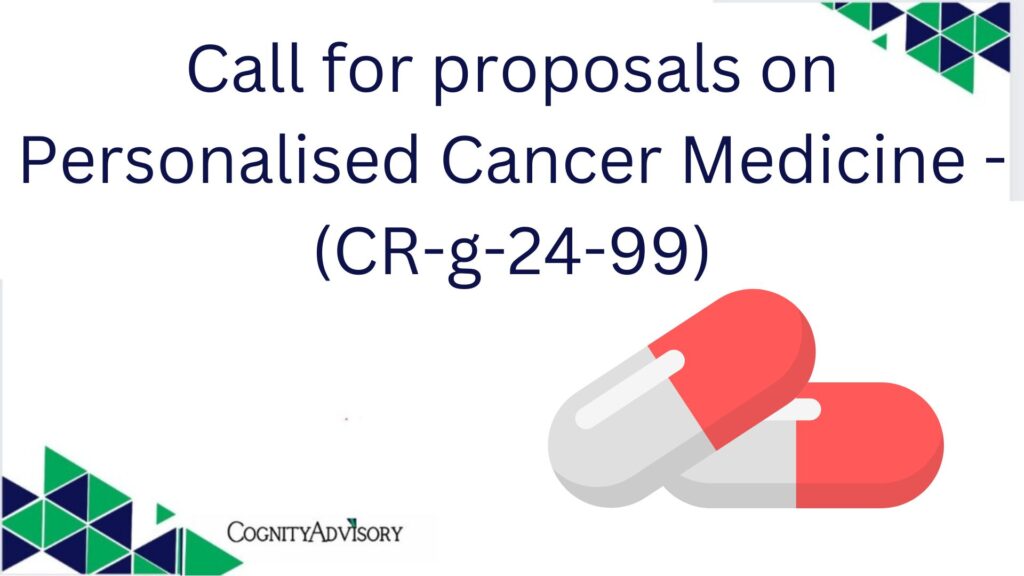General information
Programme
EU4Health Programme (EU4H)
Call
EU4H Action Grants 2024 (EU4H-2024-PJ-03)
Type of action
EU4H-PJG EU4H Project Grants
Type of MGA
EU4H Action Grant Budget-Based [EU4H-AG]
Open For Submission
Deadline model
single-stage
Opening date
17 September 2024
Deadline date
22 January 2025 17:00:00 Brussels timeTopic description
Expected Impact:
The action will benefit cancer patients accessing personalised cancer medicine services, which is expected to reduce the burden of cancer in the Member States.
The expected results will include initiatives to complement the Member States’ efforts in the design, planning and implementation of best practices, such as support for the development of public health guidelines (e.g., personalised cancer medicine, genomic testing/screening and metastatic cancer management) guidelines and, support for the preparation and roll out of new policy approaches; participation in the pilot testing of innovative practices; development of capacity building actions such as training and twinning, health communication or health literacy.
The actions that will complement the Joint Action on Personalized Cancer Medicine are expected to bring short-term improvements in implementing personalised cancer medicine and sharing best practice among Member States and countries associated to the EU4Health Programme. In the mid- to long- term, this is expected to improve innovation and patient management in the cancer pathway, including metastatic cancer, by improving knowledge and skills in implementing personalised medicine in oncology.Objective:
The aim of the action is to complement the implementation of the ‘Joint Action on Personalized Cancer Medicine’ led by the Member States, thus helping to reduce the burden of cancer both at a personal and societal level, namely by supporting the Europe’s Beating Cancer Plan and policy initiatives on personalised medicine. It may also support other Union initiatives that aim at improving public health, such as the ‘1+ Million Genomes’ Initiative and the Initiative to Understand Cancer (UNCAN.eu) in so far as it shares the objectives of promoting personalised treatments and support ground-breaking research needed to advance the understanding of cancer mechanisms in order to improve the cancer care pathway.
This action should cover the ambition of the sixth flagship of the Europe’s Beating Cancer Plan, the ‘Cancer diagnostic and treatment for all’ initiative. It will build on the results of the
EU4Health Programme funded projects, such as the Personalised Cancer Medicine for all EU citizens (‘PCM4EU’), the EU Cancer and Public Health Genomics platform project (‘CAN.HEAL’), as well as the project for improved diagnostics and survival for all children with Acute Myeloid and the Leukaemia treated within the NOPHO-DB- SHIP consortium; a cross-European collaboration (‘CHIP-AML22’). The action will also make use of the guidelines, protocols and best practices, developed under other European Commission funded initiatives and projects such as the 1+ Million Genomes Initiative, a European-wide foundation to accelerate Data-driven Cancer Research (EOSC4Cancer), and Partnership on Transforming Health and Care Systems (THCS) as well as Innovative Health Initiative (IHI)funded projects could also be considered.Scope:
Activities will contribute to the Joint Action on Personalized Cancer Medicine’, and include:
a) the implementation of targeted projects involving civil society organisations and industry complementing the Member States’ efforts in the design, planning and implementation of best practices (e.g., on metastatic cancer);
b) the production of public health guidelines concerning personalised cancer medicine, genomic testing/screening and metastatic cancer management;
c) patients and caregivers consultations, and other actions that can benefit citizens directly;
d) preparation and roll out of innovative practices;
e) support capacity building actions such as training and twinning, health communication or health literacy.
Activities should also include an equity dimension and aim at reducing health inequalities.
